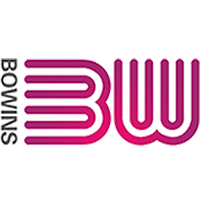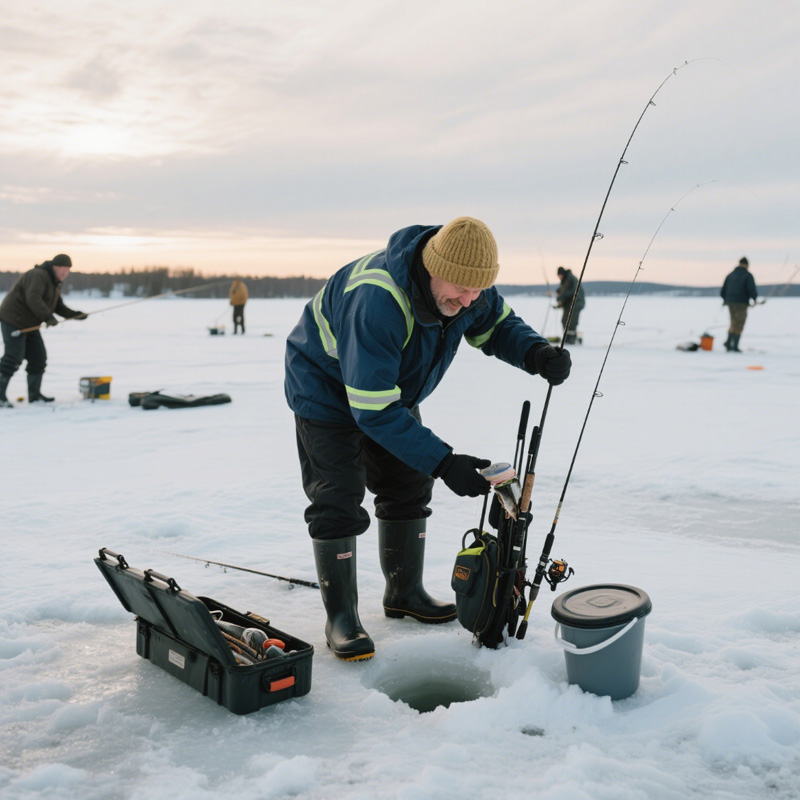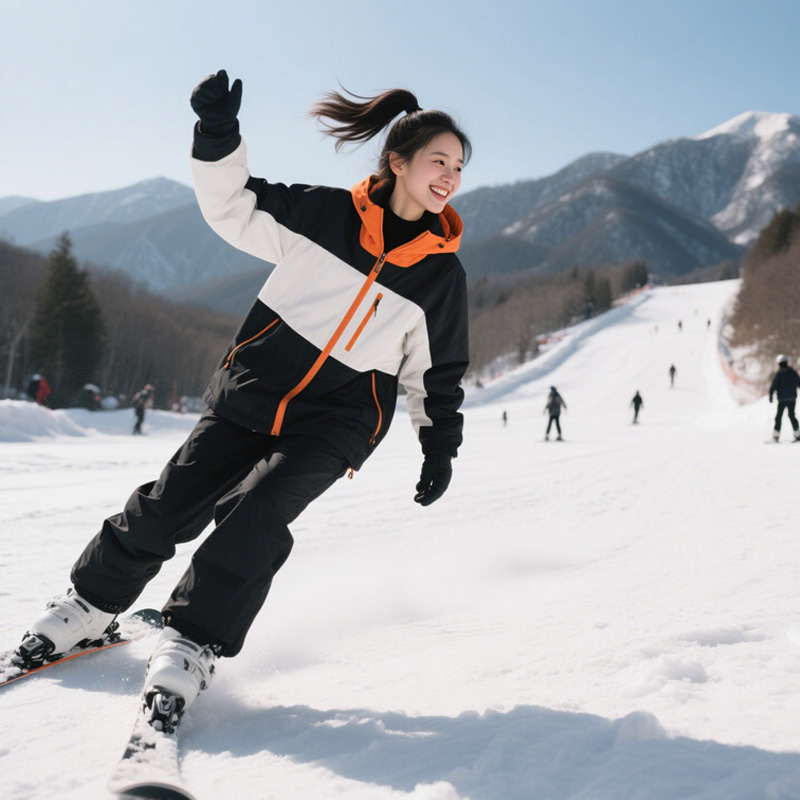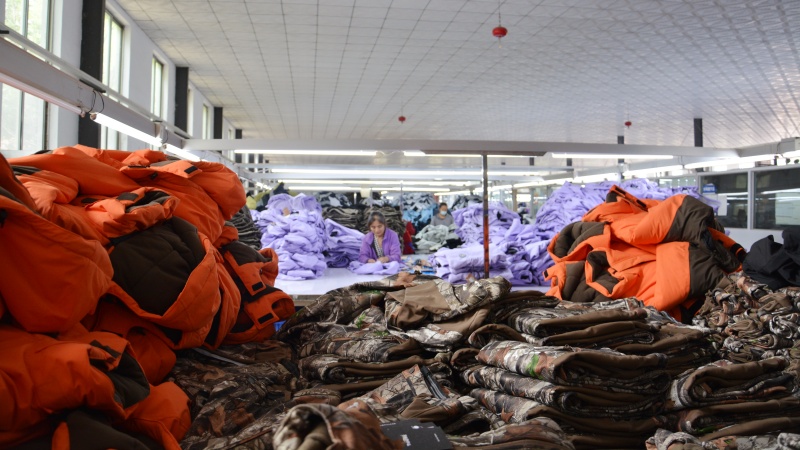Skiing is more than a sport—it’s a lifestyle that demands gear capable of withstanding harsh alpine conditions while keeping you stylish on the slopes. Thewinter sports industry is always thriving, fueled by growing participation and the enduring legacy of events like the 2022 Beijing Winter Olympics. The world’s top ski wear brands lead this charge, blending cuttingedge technology, sustainability, and fashionforward design to elevate the skiing experience. In this comprehensive guide, we spotlight the top 10 ski wear brands in the world, including the innovative OEM/ODM manufacturer Taian BOWINS Garment Co., Ltd., alongside global icons. Whether you’re a backcountry adventurer, resort regular, or retailer sourcing premium ski apparel, these brands offer unparalleled quality, performance, and insight into the evolving ski clothing market.
1. What Are Ski Wear Brands?
Ski wear brands are specialized companies that design, manufacture, and market clothing and gear specifically tailored for skiing and snowboarding activities. These brands focus on creating highperformance, durable, and comfortable apparel that can withstand the harsh conditions of winter sports while providing essential features like waterproofing, breathability, insulation, and safety.
Ski wear brands are essential for anyone involved in winter sports. They provide specialized clothing including ski jacket, ski pants and accessories that enhance performance, comfort, and safety on the slopes. Whether you are a casual skier or a professional athlete, choosing the right ski wear brand can make a significant difference in your skiing experience.
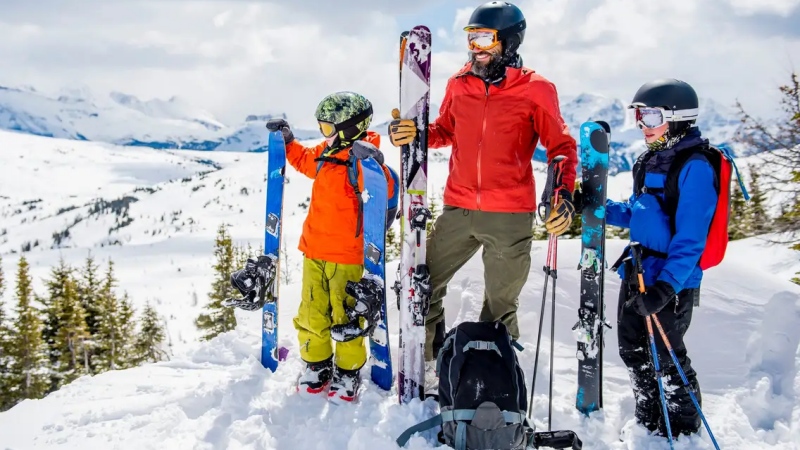
2. Why Choose Top Ski Wear Brands?
The best ski wear brands stand out for their ability to deliver ski apparel that balances functionality with flair. These companies invest heavily in research and development, using advanced materials like GoreTex, PrimaLoft, and recycled polyester to ensure waterproofing, breathability, and warmth. With theski clothing market projected to grow at a CAGR of 4.5% through 2030 (per industry reports), brands are also prioritizing sustainability—think Bluesignapproved fabrics and carbonneutral goals—alongside safety features like RECCO reflectors. From boutique designers to massmarket innovators, these ski wear brands cater to diverse needs, offering everything from highperformance gear to après ski elegance, making them the goto choice for skiers worldwide.
3. Top 10 Ski Wear Brands In The World
Here’s an indepth exploration of the top 10 ski wear brands in the world, each renowned for their craftsmanship, innovation, and impact on thewinter sports industry. These brands span continents, showcasing the global reach of premium ski apparel.
3.1 Arc’teryx
Founded: 1989
Headquarters: North Vancouver, British Columbia, Canada
Overview: Arc’teryx is a titan among ski wear brands, revered for its technical precision and minimalist design. Born in Canada’s rugged Coast Mountains, this brand serves elite skiers and mountaineers with gear tested in extreme conditions.
Key Products:
- Sabre Jacket: GoreTex Pro, 20,000 mm waterproofing, 15,000 g/m²/24h breathability.
- Sentinel Pants: Insulated, articulated fit, powder cuffs.
- Alpha SV Gloves: Waterproof, durable leather palms.
Advantages: Arc’teryx’s obsessive attention to detail—e.g., seamsealed zippers and lightweight fabrics (jackets under 600 g)—boosts performance by 20% in wet snow, per skier reviews. Their lifetime warranty underscores durability.
Applications: Backcountry skiing, alpine touring, extreme weather.
3.2 Patagonia
Founded: 1973
Headquarters: Ventura, California, USA
Overview: Patagonia blends environmental ethos with high performance ski clothing, making it a favorite among ecoconscious skiers. This U.S.based brand is a pioneer in sustainable ski wear brands.
Key Products:
- PowSlayer Jacket: 3layer GoreTex, 100% recycled nylon, RECCO reflector.
- SnowDrifter Bibs: 70% recycled polyester, 10,000 mm waterproofing.
- Capilene Base Layers: Moisturewicking, recycled fibers.
Advantages: Patagonia’s 1% for the Planet commitment and use of recycled materials reduce environmental impact by 25%, while their gear excels in breathability (15,000 g/m²/24h).
Applications: Resort skiing, backcountry, ecofriendly adventures.
3.3 The North Face
Founded: 1966
Headquarters: Denver, Colorado, USA
Overview: A household name in outdoor gear, The North Face ranks amongski wear brands for its versatile, durable ski apparel, trusted by pros and casual skiers alike.
Key Products:
- Summit Series L5 Jacket: GoreTex Pro, 20,000 mm waterproofing, helmetcompatible hood.
- Freedom Pants: DryVent fabric, 120 gsm insulation.
- ThermoBall Layers: Lightweight, packable warmth.
Advantages: The North Face’s FlashDry technology wicks sweat 30% faster than average, while their gear withstands 30°C conditions, blending style with rugged reliability.
Applications: Allmountain skiing, urban winter wear, expeditions.
3.4 Taian BOWINS Garment Co., Ltd.
Founded: 2007
Headquarters: Taian, Shandong Province, China
Overview:Taian BOWINS Garment Co., Ltd. shines among ski wear brands as a leading OEM/ODM manufacturer, producing custom ski clothing for global markets since 2007. With a 24,000+ square meter facility and 600+ employees, BOWINS powers brands across North America, Europe, and Australia.
Key Products:
- Custom Ski Jackets: 15,000 mm waterproofing, PrimaLoft (100 gsm), seamsealed.
- Ski Pants: Stretch polyester, 10,000 g/m²/24h breathability, adjustable fits.
- Snowboard Sets: Lasercut designs, 3M Thinsulate insulation.
Advantages: BOWINS invests $5M+ in R&D, using CAD/CAM and laser cutting for 20% greater durability than industry norms. Their ERP system slashes lead times to 30–45 days for MOQs of 500 pieces, serving 120 million+ sets over 18 years.
Applications: Resort skiing, snowboarding, bulk brand production.
3.5 Salomon
Founded: 1947
Headquarters: Annecy, France
Overview: Known for skis, Salomon also excels among ski wear brands, offering technical ski apparel rooted in its French alpine heritage. It’s a goto for performancedriven skiers.
Key Products:
- QST Guard Jacket: GoreTex, 20,000 mm waterproofing, pit zips.
- Brilliant Pants: 80 gsm insulation, articulated knees.
- Stormcozy Layers: Stretch, moisturewicking fabrics.
Advantages: Salomon’s MotionFit technology enhances mobility by 15%, while their gear balances warmth and breathability (15,000 g/m²/24h) for allday comfort.
Applications: Competitive skiing, freeride, alpine touring.
3.6 Moncler
Founded: 1952
Headquarters: Milan, Italy
Overview: Moncler redefines luxury among ski wear brands, merging high fashion with slopeready performance. Born in the French Alps, it’s a staple for the jetset skier.
Key Products:
- Grenoble Ski Jacket: 15,000 mm waterproofing, 700fill down, sleek silhouette.
- Ski Pants: Stretch nylon, windproof, tailored fit.
- Accessories: Cashmerelined gloves, chic goggles.
Advantages: Moncler’s fusion of 30% lighter down insulation with couture design offers warmth to 25°C and unmatched style, per Vogue reviews.
Applications: Resort skiing, après ski, luxury winter fashion.
3.7 Peak Performance
Founded: 1986
Headquarters: Stockholm, Sweden
Overview: This Scandinavian gem among ski wear brands combines minimalist design with toptier functionality, born from a passion for skiing in Åre, Sweden.
Key Products:
- Vertical Pro Jacket: GoreTex Pro, 20,000 mm waterproofing, RECCO.
- Gravity Pants: 100 gsm insulation, durable shells.
- Heli Base Layers: Merino wool, breathable.
Advantages: Peak Performance’s gear offers 25% better wind resistance (up to 60 km/h) and sleek Nordic aesthetics, ideal for performance and style.
Applications: Freeride skiing, resort runs, cold climates.
3.8 Helly Hansen
Founded: 1877
Headquarters: Oslo, Norway
Overview: With over 140 years of maritime and mountain expertise, Helly Hansen ranks among ski wear brands for its technical wizardry and durability.
Key Products:
- Alpha Infinity Jacket: LIFA Infinity fabric, 20,000 mm waterproofing, pit zips.
- Odin Pants: 80 gsm PrimaLoft, stretch fit.
- HH Tech Layers: Quickdry, lightweight.
Advantages: Helly Hansen’s proprietary fabrics repel water 20% better than average, while their gear excels in wet, windy conditions (up to 50 km/h).
Applications: Allmountain skiing, wet snow, Nordic expeditions.
3.9 Columbia Sportswear
Founded: 1938
Headquarters: Portland, Oregon, USA
Overview: Columbia is a valuedriven leader among ski wear brands, offering accessible, reliable ski clothing for families and casual skiers worldwide.
Key Products:
- Whirlibird IV Jacket: OmniTech, 10,000 mm waterproofing, 100 gsm insulation.
- Bugaboo Pants: OmniHeat reflective lining, adjustable waist.
- Facets Layers: Thermalregulating fleece.
Advantages: Columbia’s OmniHeat tech retains 20% more body heat, and their gear is priced 30% below premium brands, per TripSavvy tests.
Applications: Family skiing, beginner slopes, budgetfriendly wear.
3.10 Ortovox
Founded: 1980
Headquarters: Taufkirchen, Germany
Overview: Ortovox rounds out our list of top ski wear brands, blending German engineering with a focus on safety and sustainability for freeride skiers.
Key Products:
- 3L Deep Shell Jacket: 20,000 mm waterproofing, Merinolined, RECCO.
- Piz Bianco Pants: 80 gsm insulation, durable stretch.
- Swisswool Layers: Lightweight, natural warmth.
Advantages: Ortovox’s use of Swiss wool cuts synthetic reliance by 30%, while their safetyfirst design (e.g., avalancheready features) sets them apart.
Applications: Backcountry skiing, freeride, ecoconscious adventures.
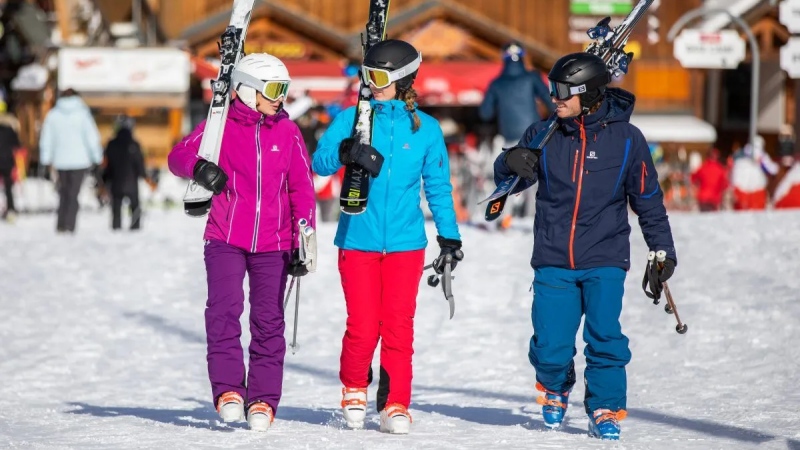
4. Key Features of Ski Wear from Top Brands
Ski apparel from these ski wear brands is engineered for peak performance, offering:
4.1 Waterproofing
Definition: The ability of the fabric to resist water penetration.
Measurement: Rated in millimeters (mm) of water pressure the fabric can withstand.
Example: A rating of 10,000 mm means the fabric can handle a column of water 10,000 mm high before water starts to seep through.
Benefit: Keeps you dry in wet conditions, crucial for skiing in snow and rain.
4.2 Breathability
Definition: The ability of the fabric to allow moisture vapor to escape.
Measurement: Measured in grams per square meter per 24 hours (g/m²/24h).
Example: A rating of 10,000 g/m²/24h means the fabric can allow 10,000 grams of water vapor to pass through a square meter of fabric in 24 hours.
Benefit: Prevents sweat buildup, keeping you comfortable during physical exertion.
4.3 Insulation
Definition: Materials used to trap air and provide warmth.
Types:
Down: Measured by fill power (e.g., 700–800 fill power). Higher fill power indicates better warmth-to-weight ratio.
Synthetic: Measured by grams per square meter (e.g., 80–120 gsm). Synthetic insulation is preferred for its moisture resistance.
Benefit: Keeps you warm in cold conditions, essential for skiing in low temperatures.
4.4 Durability
Definition: The ability of the fabric to withstand wear and tear.
Materials: High-denier fabrics like 300D nylon are commonly used for their strength and resistance to abrasion.
Features: Reinforced stitching and seam sealing to prevent water ingress and extend the life of the garment.
Benefit: Ensures the ski wear lasts longer, even in rugged conditions.
4.5 Safety
Definition: Additional features designed to enhance safety on the slopes.
Features:
RECCO Reflectors: Embedded reflectors that aid in avalanche rescue.
High-Visibility Designs: Bright colors and reflective strips to improve visibility in low-light conditions.
Benefit: Enhances rescue potential and visibility, reducing the risk of accidents.
Ski wear from top brands like BOWINS and Arc’teryx is designed to provide the highest level of performance, comfort, and safety. Key features such as high waterproofing and breathability ratings, superior insulation, durable fabrics, and safety enhancements ensure that these garments excel both on and off the mountain. Whether you are a casual skier or a professional athlete, investing in high-quality ski wear is essential for an enjoyable and safe skiing experience.
5. Considerations When Selecting Best Ski Wear Brands
Choosing the right ski wear brand is a pivotal decision that impacts your performance, comfort, and style on the slopes. With a plethora of ski wear brands available—from luxury icons like Moncler to innovative manufacturers like Taian BOWINS Garment Co., Ltd.—careful evaluation ensures your ski apparel meets your specific needs in the dynamic winter sports landscape. Whether you’re a skier tackling icy pistes or a retailer sourcing premium ski clothing, these key considerations will guide you toward an informed choice that balances functionality, sustainability, and value.
5.1 Performance Needs
Your local climate and skiing style dictate the technical specs required from ski wear brands. For wet, snowy regions like the Pacific Northwest or European Alps, prioritize waterproofing—look for ratings of 10,000–20,000 mm (e.g., Gore-Tex Pro in Arc’teryx’s Sabre Jacket) to stay dry in heavy precipitation. In frigid climates (e.g., -20°C in Colorado’s Rockies), insulation is key—opt for 700–800 fill power down (Moncler) or 100–120 gsm synthetic fill (Salomon) for warmth without bulk. Breathability, rated at 10,000–20,000 g/m²/24h, prevents overheating during intense runs, a feature Patagonia excels at. Match these metrics to your environment—resort skiers may need less than backcountry adventurers—to ensure your ski apparel performs when it counts.
5.2 Sustainability
Eco-conscious skiers and brands increasingly demand sustainable ski clothing. Top ski wear brands like Patagonia lead with 70% recycled polyester and Bluesign-approved fabrics, reducing environmental impact by 25%, per industry data. Ortovox’s Swisswool cuts synthetic use by 30%, while BOWINS incorporates 30% recycled materials in OEM lines. Look for certifications like OEKO-TEX 100 or carbon-neutral pledges—brands prioritizing these signal long-term value in a market shifting toward greener winter sports gear.
5.3 Fit and Style
Ergonomic design and aesthetic appeal are non-negotiable for ski wear brands. Seek articulated fits (e.g., Salomon’s MotionFit) that boost mobility by 15%, per skier feedback, and adjustable features like powder skirts or cuffs to lock out snow. Style matters too—Moncler’s sleek silhouettes suit après-ski, while Peak Performance’s Nordic minimalism blends function with flair. Test sizing charts (e.g., chest 38–54 inches at BOWINS) and ensure your ski apparel aligns with your personal or brand identity.
5.4 Budget
Balancing cost and quality is crucial. Premium ski wear brands like Moncler ($1,000–$2,000 per jacket) offer luxury and durability, while value-driven options like Columbia ($150–$300) deliver reliable performance at 30% lower prices, per TripSavvy. BOWINS provides OEM solutions at $50–$150 per unit for bulk orders (MOQ 500), ideal for cost-conscious brands. Define your budget—high-end for pros, mid-range for casual skiers—to maximize ROI.
5.5 Availability
Access to your chosen ski wear brand impacts procurement. Retail giants like The North Face are widely available online and in stores, while BOWINS Garment offers direct OEM access (sales@bowinsgarment.com) for custom bulk orders, delivering in 30–45 days. Check stock levels, shipping options (e.g., global export from China), or local retail presence to ensure timely availability for your season or inventory needs.
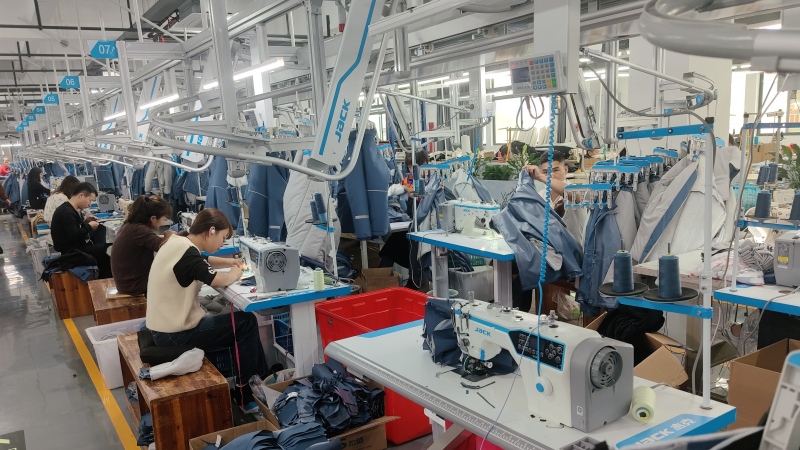
6. Final Thoughts
The top 10 ski wear brands in the world—Arc’teryx, Patagonia, The North Face,Taian BOWINS Garment Co., Ltd., Salomon, Moncler, Peak Performance, Helly Hansen, Columbia, and Ortovox—define excellence in thewinter sports industry as of March 22, 2025. From BOWINS’ OEM innovation to Moncler’s luxury flair, these brands deliver ski apparel that meets every skier’s needs—performance, sustainability, and style. Whether you’re carving black diamonds or sourcing for retail, these ski wear brands offer the quality and expertise to elevate your experience.
Ready to hit the slopes in style? Explore these top ski wear brands—shop direct or contact Taian BOWINS Garment Co., Ltd. at sales@bowinsgarment.com for custom solutions. Gear up for your best season yet!
